Alligators are found throughout the United States – and there’s even a crocodilian species known as the American alligator.
New Jersey is one of the northern states where it can get very cold, which doesn’t work well for the ectothermic aspects of the alligators.
They depend on external heat sources so that they can maintain their body temperature and survive.
While you won’t see many gators in the wild in New Jersey, you should know if there is even a small possibility.

Contents
So… Are There Alligators in New Jersey?
Alligators do not survive in the wild of New Jersey.
For the most part, alligators are only found in a few of the southern states – Florida, Louisiana, and Texas being where you’ll find the most.
In fact, it’s very uncommon for alligators to be found north of North Carolina.
When there is an alligator found in New Jersey, it is likely a result of someone having a pet alligator.
Once it gets too large for them to keep in a terrarium, they release it into the wild.
Then, it is up to the New Jersey Fish and Wildlife Commission to catch the gator and take care of it.
Taking “care” of an alligator, once caught, using means euthanasia or bringing it to a zoo or other animal sanctuary so that it can live out the rest of its days without being a nuisance.
What this means is that the likelihood of you finding an alligator in the wild in New Jersey is almost null – but never impossible.
It is also important to know that it is illegal to own an alligator in New Jersey.
If you do want to see an alligator when you’re in New Jersey, your best bet is to see one in captivity.
Some places to go to see an American Alligator in captivity include:
- Turtle Back Zoo in West Orange
- Cape May County Zoo in Cape May
- Adventure Aquarium in Camden
- Van Saun County Park in Paramus
- Liberty Science Center in Jersey City
Herpetologists say that most alligators won’t survive in the wild past summer or fall.
When you see them in captivity, it is because they have been given a hospitable environment where the water may be warmed for them or they are given UV lamps to lounge under.
Alligator Species in New Jersey
There are actually 23 species of crocodilians on the planet, though only two are categorized as alligators – the Chinese Alligator and the American Alligator.
The Chinese alligator isn’t found outside of southeast Asia unless it’s in a zoo, and even then, it’s extremely rare.
That leaves the American Alligator, also known as the Alligator mississippiensis.
It is commonly referred to as simply a “gator” in many instances.
The species’ name is a cross between its Spanish and Latin roots to essentially mean the lizard of the Mississippi River.
The habitat for the American alligator includes freshwater swamps and marshes, though it will also call various lakes, rivers, and smaller bodies of water home.
It can tolerate some salinity, which is why it won’t mind living in brackish water, such as what is found around mangroves.
They don’t have salt-secreting glands like crocodiles, so they won’t be in full saltwater bodies of water.
Gators have the ability to create burrows so that they can hibernate, which means they have the means to tolerate limited periods of freezing weather – and that’s why they can actually survive if they have been set free in the wild of New Jersey in many instances.
Is It Safe to Swim in New Jersey?
There are a lot of areas that are safe for you to swim in New Jersey.
Alligators are not going to be your primary concern.
Instead, you’d want to focus on the bacteria that may be in the water as well as the amount of trash.
For the most part, New Jersey is known for some of its outstanding beaches, particularly around the Jersey Shore.
You can find all sorts of great places to swim throughout the state.
Some are natural while others are manmade. In fact, check out these:
- Oxford Furnace Lake, Oxford Township
- Bellmawr Lake, Bellmawr
- Darlington County Park, Mahwah
- Hooks Creek Lake, Cheesequake State Park
- Lake Marcia, Sussex County
- Rock Lodge, Hardyston Township
- Tomahawk Lake, Sparta
Many of the shorelines are clean, though some are rocky.
You’ll be able to see any and all potential threats that may be lurking at the coast so that you can feel more confident about going into the water.
Some of the areas will post signs if there are any threats that you have to be concerned about.
Don’t forget to read those signs and pay attention if there are markers telling you not to go past a certain point – they are there for your own protection.
The various counties and municipalities may also publish water quality reports so that you know if there are any bacteria or anything else to be aware of before you go swimming in any of the bodies of water.
Interesting Alligator Facts in New Jersey
Most experts agree that alligators will not be able to survive once the dead of winter appears since New Jersey will see snow – and it’s not uncommon for certain bodies of water to freeze during the colder spells.
There have been reports of “rogue reptiles” showing up in various neighborhoods.
For example, in 2018, there was a reptile that measured about four feet long and was spotted in a neighborhood within Mullica Township.
There were varying reports, however.
Some thought it was an alligator while others thought it was a caiman.
Caimans are alligatorid with larger and higher set eyes than an alligator.
These are considered exotic species as they are native to Central and South America.
You’re just as likely to see one of these in the wild of New Jersey as you are an actual alligator.
Most of the alligators that are found in New Jersey are small.
They aren’t capable of doing much damage, even if they were to attack a human.
They are usually around two to three feet long – and that’s small considering that adult males can often reach 11 feet long.
Most are caught before they have a chance to grow to adult size – and that means that you’ll almost never hear about any gator attacks in New Jersey.
You may also hear about the talk of New Jersey Gators.
This isn’t actually a special breed of alligators.
Instead, it is a girls’ softball team that is part of the NFCA.
They are a nationally ranked program within the northeast region.
While they may be fierce on the field, they are considerably more docile than wild alligators.
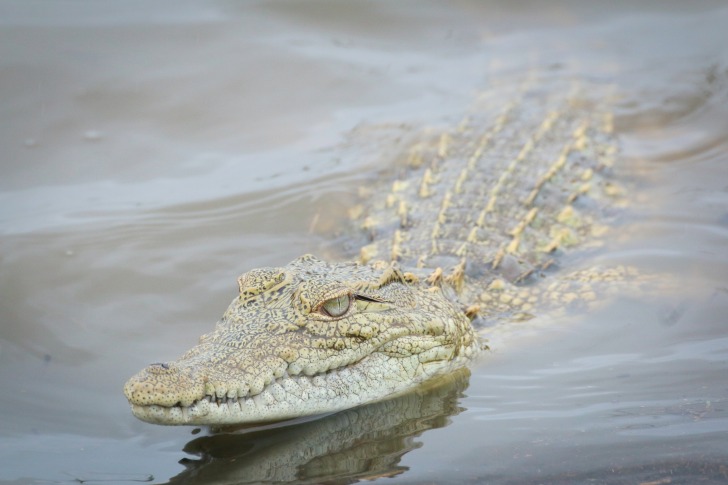
Alligators vs. Crocodiles
Many people lump alligators and crocodiles into being the same.
However, there are quite a few differences that exist.
While they are within the same order as crocodilians, they are different species – and tend to have entirely different habitats, too.
Alligators live in freshwater and, at times, brackish water.
Meanwhile, crocodiles tend to live solely in saltwater because that is what their salt-secreting glands allow them to do.
Alligators have an overbite, but you won’t see their teeth when their mouths are closed.
Crocodiles will have several teeth visible when their mouths are closed, giving them a constantly menacing look.
Alligators also have a rounded snout and shorter legs than crocodile, which has a pointed snout and longer legs.
Even the coloring is different – alligators tend to be black and gray while crocodiles are brownish and green.
Both are excellent at camouflage, which is what makes them such dangerous predators within their ecosystems.
You’ll only find alligators inside of New Jersey, and even then, it’s rare.
The only time that you’ll find a crocodile in New Jersey is within captivity – such as in a reptilian section at a zoo.
3 Safety Tips for Swimming in Alligator-Infested Waters
Alligator-infested waters are generally well-known.
You will never accidentally wander into infested waters unless you simply don’t read any of the signs.
Most lakes and rivers where there are constant sightings will provide you with warnings so that you know to proceed with caution – or to avoid going into the body of water at all.
If you are going to go into any kind of alligator-infested water, there are safety tips that you should follow.
- Don’t swim alone. Always make sure that there are others who are with you. This way, if you are attacked, there is help to get you out of the water.
- Don’t bother the alligators. Most alligators are docile and have no desire to deal with humans. Ignore them and they’ll ignore you.
- Avoid going into the water where there’s a lot of high grass. The high grass areas are where alligators are likely to nest, so if they feel as though their young is under attack, they’ll attack to protect themselves.
Summary
Alligators are not native to New Jersey, so the likelihood of you finding one in the wild is extremely rare.
While you’ll always hear about the occasional story of someone finding one in a lake or even their swimming pool, it is usually because of someone who had kept a gator as a pet illegally – and then released it into their community.
Most alligators live in the southeastern part of the United States.
If you want to see an alligator when you’re in New Jersey, the best thing that you could do would be to visit a zoo or other animal sanctuary where they have some of the large reptiles living in captivity.
New Jersey Safety Overview
READ THE FULL REPORT: New Jersey Safety Review
Safety Index:
- OVERALL RISK: LOW
- TRANSPORT & TAXIS RISK: LOW
- PICKPOCKETS RISK: LOW
- NATURAL DISASTERS RISK: LOW
- MUGGING RISK: MEDIUM
- TERRORISM RISK: MEDIUM
- SCAMS RISK: MEDIUM
- WOMEN TRAVELERS RISK: LOW
Frequently Asked Questions
Does running zig-zag help if being chased by an alligator?
No!
Alligators can run pretty fast.
The best thing to do is to run in a straight line and run as fast as you can.
How many gator attacks occur every year?
There are not many gator attacks in a year – and all happen in the southeastern states where alligators are native.
The Florida Fish & Wildlife Conservation Commission identifies that there are typically three major attacks every year, and that’s usually when the alligators are provoked.
Can an alligator survive a cold winter?
Yes.
Alligators have the ability to survive some of the colder weather, which is why it’s possible to see alligators grow to some incredible sizes when they are let loose in the wild.
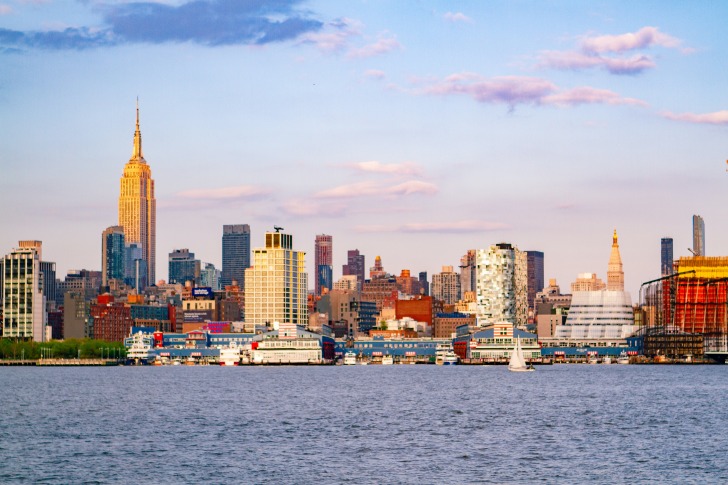
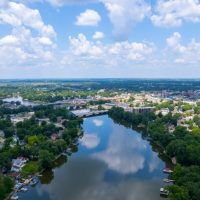
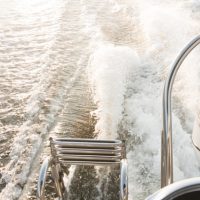



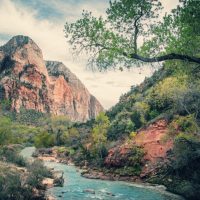





Alligators are not native to New Jersey, so the likelihood of finding one in the wild is extremely rare. They primarily live in the southeastern United States and depend on external heat sources to survive.
It is illegal to own an alligator in New Jersey and if one is found in the wild, it is likely a result of someone releasing a pet. If you want to see an alligator in New Jersey, it is best to visit a zoo or animal sanctuary. Always proceed with caution when near bodies of water and follow any posted warnings.